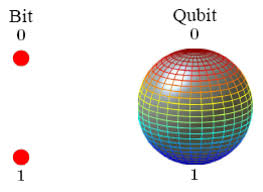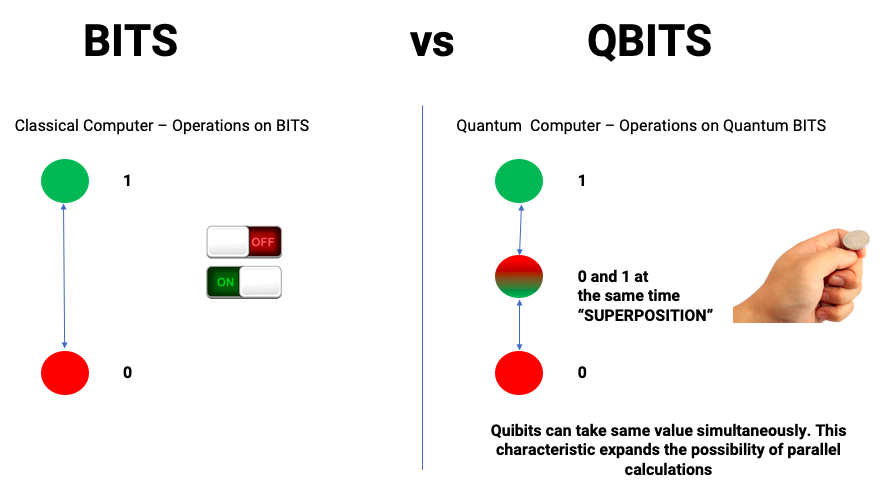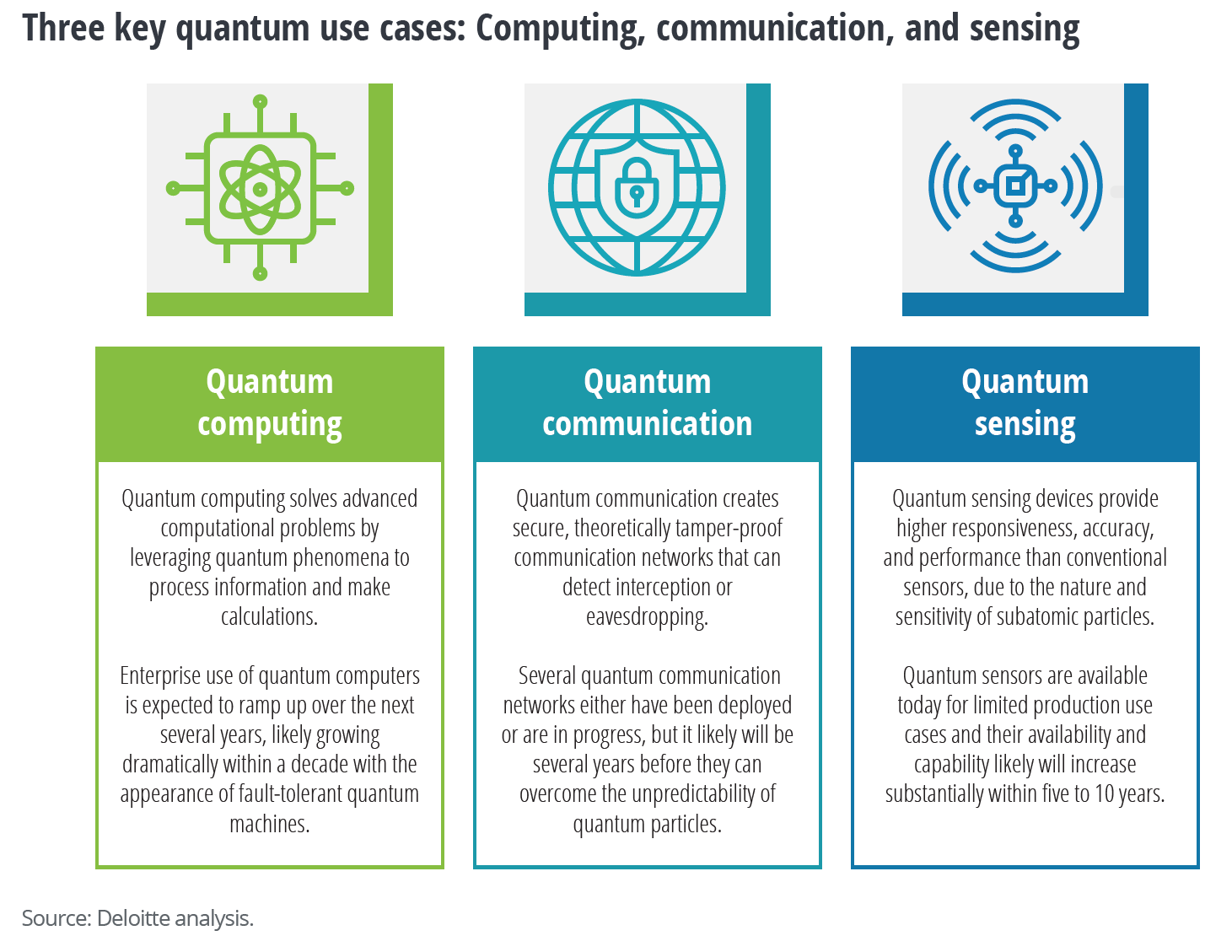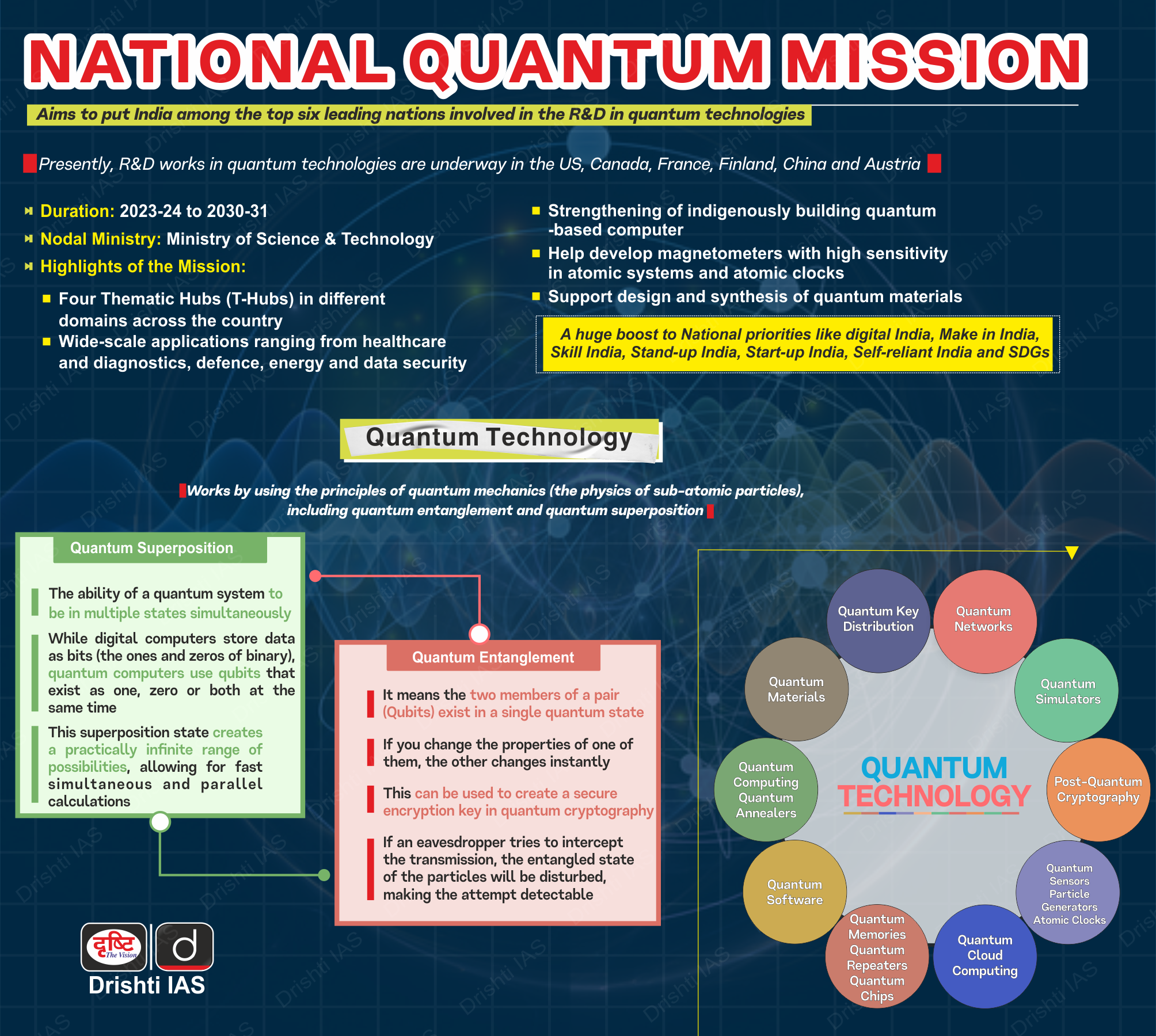Science & Technology
Quantum Technology
- 16 Jan 2025
- 14 min read
For Prelims: Quantum Computing, National Quantum Mission, Centre for Development of Telematics (C-DOT), I-HUB Quantum Technology Foundation, Centre for Development of Advanced Computing (C-DAC), Internet-of-Things, Machine Learning
For Mains: Significance of Quantum Computing, India’s Initiative in Quantum Computing- Related Challenges, Opportunities and Way Forward
What is Quantum Technology?
- About:
- Quantum computing/technology refers to a class of technologies that leverage the principles of quantum mechanics to perform computations and achieve capabilities not possible with traditional technology.
- Conventional Vs Quantum Computing:
- Conventional Computing:
- Conventional computing processes information in "bits," which represent either a 1 or a 0 at any given time, operating under the principles of classical physics.
- Conventional Computing:
- Quantum Computing:
- Quantum computers operate using "qubits" (quantum bits), which determine the behavior of matter at the atomic scale.
- These exhibit probabilistic behavior, enabling them to achieve tasks beyond the scope of traditional technologies, while classical systems follow deterministic laws.
- Key Features:
- Superposition: Qubits can exist in a state of quantum superposition, meaning they can represent both 1 and 0 simultaneously.
- This unique property allows quantum computers, in theory, to perform computations as if multiple classical computers are working in parallel.
- For instance, a coin in mid-air represents both heads and tails simultaneously until it lands. Similarly, an electron can exist in a quantum superposition until measured.
- Entanglement: Entanglement occurs when two qubits exist in a shared quantum state, such that a change in the state of one qubit instantaneously affects the other, regardless of the distance between them.
- Albert Einstein referred to this phenomenon as "spooky action at a distance."
- Decoherence: Decoherence is the process in which quantum particles and systems can decay, collapse or change, converting into single states measurable by classical physics.
- Interference: Quantum interference allows particles (such as qubits) to be in multiple positions simultaneously due to superposition.
- A single particle, like a photon, can interfere with its own trajectory, altering its path predictably.
- Superposition: Qubits can exist in a state of quantum superposition, meaning they can represent both 1 and 0 simultaneously.
What are the Key Applications of Quantum Technology?
- Pharmaceuticals:
- Quantum computers can simulate molecular behavior, accelerating the development of life-saving drugs and treatments.
- It aids in studying protein folding, with potential applications in treating diseases like Alzheimer’s and Parkinson’s.
- Chemistry:
- Quantum particles can enhance chemical processes, such as improving catalysts for petrochemical alternatives and reducing harmful emissions.
- These are also crucial for developing high-temperature superconductors.
- Improving Advanced Technologies:
- Quantum materials are used in advanced technologies such as energy-efficient devices, solar cells, batteries, and healthcare diagnostics.
- Quantum materials are substances that exhibit unique and complex properties at the quantum level. These materials are characterized by their behavior, which is governed by quantum mechanics.
- Example: Fluorescent quantum dots aid in multicolour bioimaging and cellular protein labelling, QLED (Quantum Dot Light Emitting Diode)
- Quantum materials are used in advanced technologies such as energy-efficient devices, solar cells, batteries, and healthcare diagnostics.
- Enhancing Machine Learning:
- Quantum computing can enhance machine learning by developing innovative algorithms that analyze complex data patterns beyond the reach of traditional methods.
- Quantum algorithms can optimize AI models, accelerating tasks and reducing energy consumption.
- Disaster Management:
- Tsunamis, drought, earthquakes and floods may become more predictable with quantum applications.
- The collection of data regarding climate change can be streamlined in a better way through quantum technology.
- Secure Communication:
- China's quantum communications satellite, Micius, launched in 2016, became the world's first to demonstrate secure quantum communication links between ground stations and satellites.
- This advancement is crucial for satellites, military, and cybersecurity, offering the potential for ultra-fast computing and unhackable communication, ensuring high levels of security for users.
- Quantum Cryptography:
- Quantum cryptography strengthens cybersecurity by creating encryption that is theoretically unbreakable, safeguarding sensitive data from the decryption capabilities of future quantum computers.
What is Quantum Mechanics?
- About:
- Quantum mechanics is a fundamental theory in physics that describes the behavior of matter and energy at very small scales, such as atoms and subatomic particles.
- It differs significantly from classical physics, which governs the behavior of objects at macroscopic scales.
- Quantum mechanics provides the framework for understanding phenomena that cannot be explained by classical physics.
- Applications:
- Quantum Computing: Exploiting superposition and entanglement to perform computations at speeds unimaginable with classical computers.
- Quantum Cryptography: Providing theoretically unbreakable encryption methods using the principles of quantum mechanics.
- Quantum Sensors: Enhancing measurement precision beyond classical limits, with applications in medical imaging, navigation, and environmental monitoring.
- Quantum Simulation: Allowing the simulation of complex quantum systems to study chemical reactions, material properties, and biological processes.
What is the National Quantum Mission?
- About:
- The National Quantum Mission (NQM) is an initiative of the Government of India which aims to advance scientific and industrial research in Quantum Technology (QT), fostering economic growth and establishing India as a global leader in Quantum Technologies and Applications (QTA).
- It is administered under the Ministry of Science & Technology and is being implemented from 2023 to 2031.
- With the launch of this mission, India will be the seventh country to have a dedicated quantum mission after the US, Austria, Finland, France, Canada and China.
- Key Objectives:
- Development of Quantum Computers: Create intermediate-scale quantum computers with 50-1000 physical qubits over 8 years, using platforms like superconducting and photonic technologies.
- Secure Communications:
- Satellite-based secure quantum communication between ground stations over 2000 km within India.
- Long-distance secure quantum communications with other nations.
- Inter-city quantum key distribution over 2000 km.
- Establishment of a multi-node quantum network with quantum memories.
- Quantum Sensing and Metrology:
- Development of high-sensitivity magnetometers and atomic clocks for precision timing, communications, and navigation.
- Quantum Materials and Devices:
- The mission supports designing quantum materials like superconductors and topological materials for quantum devices, and developing single-photon sources, detectors, and entangled photon sources for quantum applications.
- Establishment of Thematic Hubs (T-Hubs): Set up 4 T-hubs in top academic and national R&D institutes in the domains of:
- Quantum Computing
- Quantum Communication
- Quantum Sensing & Metrology
- Quantum Materials & Devices
Initiatives Related to Quantum Technology in India
- Quantum Lab: The Indian Army established the Quantum Lab at the Military College of Telecommunication Engineering in Madhya Pradesh to lead research and training in quantum technologies.
- QuEST Initiative: The Department of Science and Technology launched the QuEST (Quantum-Enabled Science and Technology) initiative to develop research facilities for quantum technology.
- QSimToolkit: An indigenously developed toolkit, QSimToolkit, enables researchers and students to learn and understand quantum computing, facilitating skill development in quantum coding and hardware design.
- Centre for Development of Telematics (C-DOT): C-DOT has developed Quantum Key Distribution (QKD) products and continues to pursue research in quantum communication.
- Private Sector Involvement: Tech giants like Google and International Business Machines (IBM) have dedicated programs in India for quantum computing, while Indian startups such as BosonQ, QRDLab, and QpiAI are working on quantum-based applications.
- I-HUB Quantum Technology Foundation: The Department of Science and Technology, along with 13 research groups from IISER Pune, launched the I-HUB Quantum Technology Foundation to promote the growth of quantum technologies.
Note:
- The United Nations (UN) has decided to observe the year 2025 as the International Year of Quantum Science and Technology (IYQ).
What are the Challenges in Adoption of Quantum Technology in India?
- Regulation and Standards: Currently, there is absence of standards for quantum hardware, software, and communication interfaces to ensure compatibility and interoperability.
- Also, there is no clear intellectual property ownership and licensing frameworks.
- Infrastructure Issues: Building and maintaining advanced labs, specialized equipment, and high-performance computing facilities demand substantial resources.
- Continuous infrastructure upgrades are essential for progress.
- Scalability and Technical Challenges: Scaling quantum systems to hundreds or thousands of qubits while maintaining coherence and minimizing error rates remains a significant challenge.
- Quantum computers need extremely low temperatures to preserve qubits' quantum states, as higher temperatures cause increased atomic movement, leading to decoherence and loss of quantum properties.
- Limited R&D Investment: India's Gross Expenditure on R&D (GERD) stands at 0.64% of its Gross Domestic Product (GDP) (as of 2020-21), which is low compared to developed economies like the US, South Korea, and China.
- Additionally, the private sector contributes around 36% to R&D, lagging behind advanced nations like the US and China where private investment is over 70%.
Way Forward
- Encourage Private Investment: Encourage private sector participation through tax incentives, grants, and public-private partnerships to boost quantum R&D investment.
- Promote Regional Infrastructure Development: Allocate resources to develop quantum research facilities across India, ensuring wider regional participation and talent distribution.
- Establish a Dedicated Regulatory Body: Set up a central body to regulate quantum technologies, draft relevant policies, and ensure their effective implementation.
- Facilitate Technology Transfer: Strengthen mechanisms to bridge the gap between academic research and commercialization, enabling private companies to leverage advanced quantum technologies.
- Strengthen IPR Framework: Develop clear and efficient frameworks for the ownership, licensing, and transfer of quantum-related intellectual property, promoting innovation and collaboration.
UPSC Civil Services Examination Previous Year Question (PYQ)
Prelims
Q. Which one of the following is the context in which the term "qubit" is mentioned?
(a) Cloud Services
(b) Quantum Computing
(c) Visible Light Communication Technologies
(d) Wireless Communication Technologies
Ans: (b)
Mains
Q. “The emergence of the Fourth Industrial Revolution (Digital Revolution) has initiated e-Governance as an integral part of government”. Discuss. (2020)










